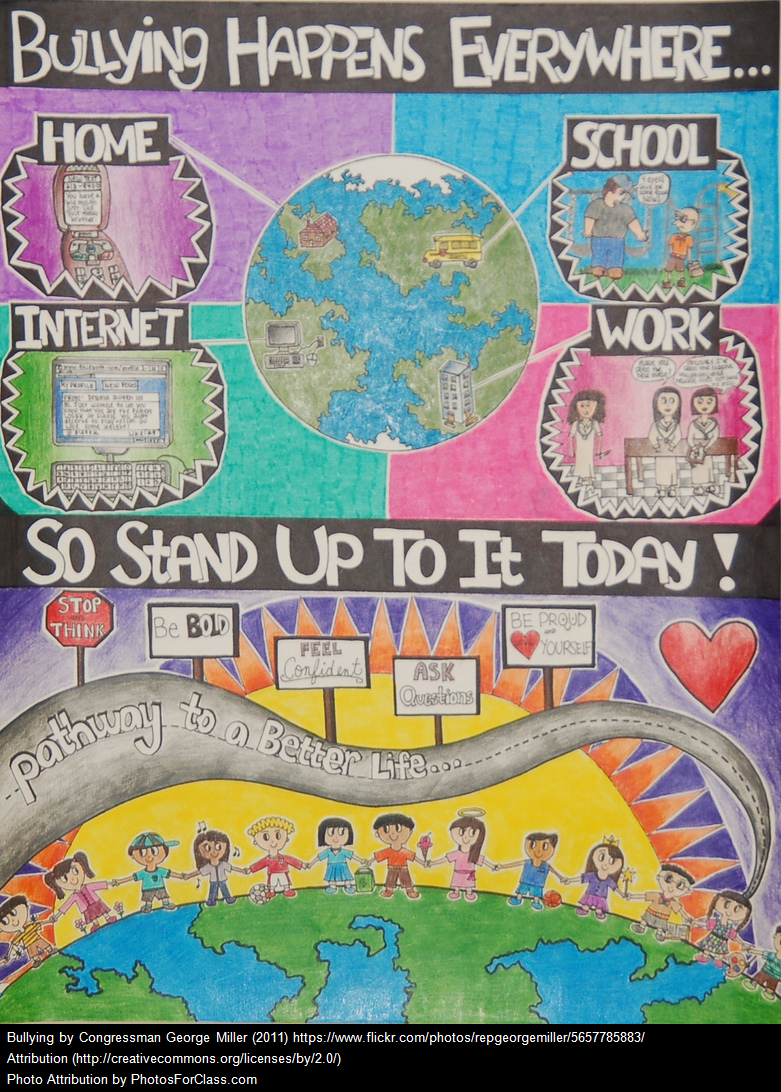Bullying continues to impact on the wellbeing of pupils, parents and professionals
Bullying UK National Bullying Survey
To coincide with Anti Bullying Week 2016, a new national survey from Bullying UK finds that bullying continues to impact on the wellbeing of pupils, parents and education professionals.Data from 8,970 respondents* showed that:
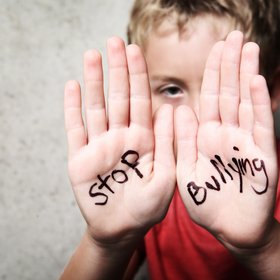
-
65% parents surveyed said their child had been bullied more than 8 times. 57% of parents stating their child had taken time off school because of bullying
-
82% of parent/carer respondents stated bullying of their child took the form of name calling with 65% stating the bullying was physical
-
81% young people experienced name calling, 55% social bullying, 40% physical and 34% cyberbullying as the type of bullying received
The survey also found
-
82% of teachers reported that name calling regularly took place during break-time
-
60% of parent respondents stated that their child needed medical attention arising from bruising and 25% cuts to a part of the body
-
Despite 79% of parents reporting their concerns to the school, 90% responded that the bullying did not stop once the school was involved and 39% felt the school did not take their complaint seriously
-
65% of teachers feel it is difficult to keep on top of bullying within schools
-
45% of schools involved the police because of bullying incidents within schools
When teacher respondents were asked when they felt bullying mostly occurs
-
82% stated at lunch
-
70% stated at break
-
45% in the corridors
-
76 % school help young people who are being bullied out of school or online
Addressing and tackling the problem of bullying
Many schools are committed to tackling bullying and of those who engaged with our survey said:
-
75% felt a greater teacher presence could help minimise bullying
-
86% school deliver lessons on bullying for pupils, with81% stating these lessons were delivered via PSHE sessions and 68% disseminated via assembly
-
95% of respondents stated their school has an anti-bullying policy with 70% indicating that this policy is updated regularly
-
94% felt lunch time staff should receive training on bullying
-
Just 29% believed in the benefits of restorative justice however and only 16% counselling
When highlighting their own experiences of bullying, 82% of parents’ respondents recalled feelings of low self-esteem and lacking confidence equally. 45% had trust issues and had difficulty forming relationships.
Teacher, pupil and parent respondents told us
(Teacher)”The sad thing is that we all know this goes on, we have no powers as teachers, but as a human being I try to instil in my students the effects bullying has had on people including myself as a youngster. There does not seem to be any consequences for their actions so they continue to bully. They get away with far more outside the classroom and bullying to them is just all in a ‘Normal day’ for them.”
(Pupil) “Sarcastically calling me a sexy bitch and then touching my “bum” and looking up my skirt to the point i feel uncomfortable walking in front of them or near them.”
(Parent) “He was assaulted resulting in head injuries left untreated by the school, he was told he was a boy lover, ignored by many members of his class threatened that he would be found out online.”
Jeremy Todd, Family Lives Chief Executive says
“Our survey of close to 9,000 respondents highlights that bullying remains a key area of concern for young people, pupils, parents and education professionals and continues to impact negatively on those it affects. There needs to be a stronger partnership between parents, pupils and teachers to tackle child experiences of bullying in and beyond the school. All schools must have rigorous anti-bullying policies and procedures and concerned parents can ask their child’s school to show them what they have in place to tackle bullying. Parental engagement and an active interest in their child in the school and in the home plays a key role in improving outcomes for children. We know that barriers that prevent parents from taking on an active role in their child’s learning remain, and we are committed to working collaboratively to help families overcome those barriers. Although circumstances vary depending on the type of school, teachers tell us that the tension between a heavy workload and the demands from parents for more time-consuming forms of communications must be eased if engagement is going to improve. Schools, families and stakeholders across education must engage with each other for the benefit of the wellbeing of all.”
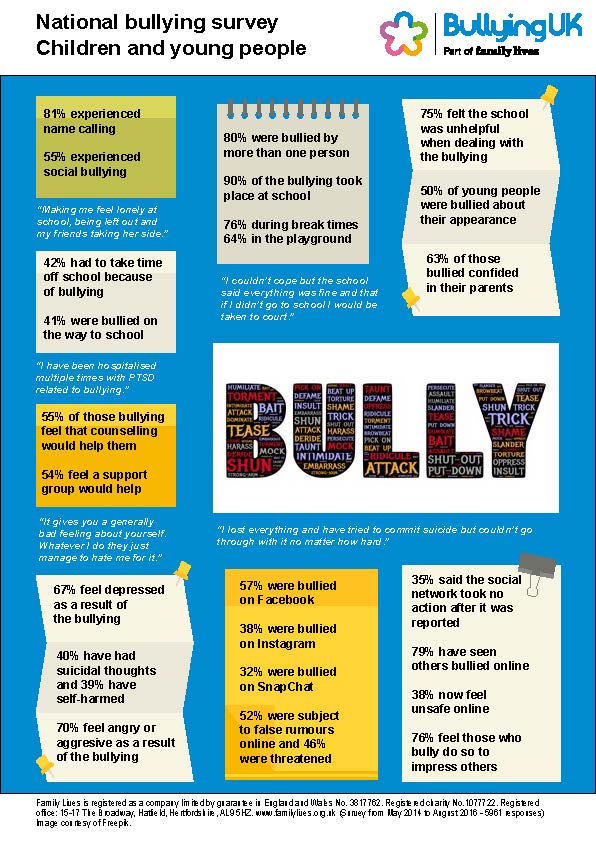
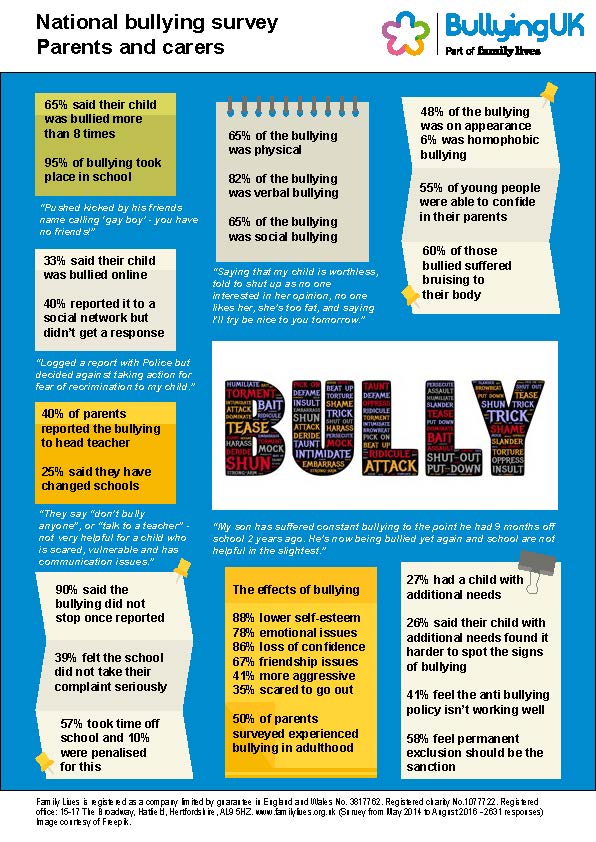
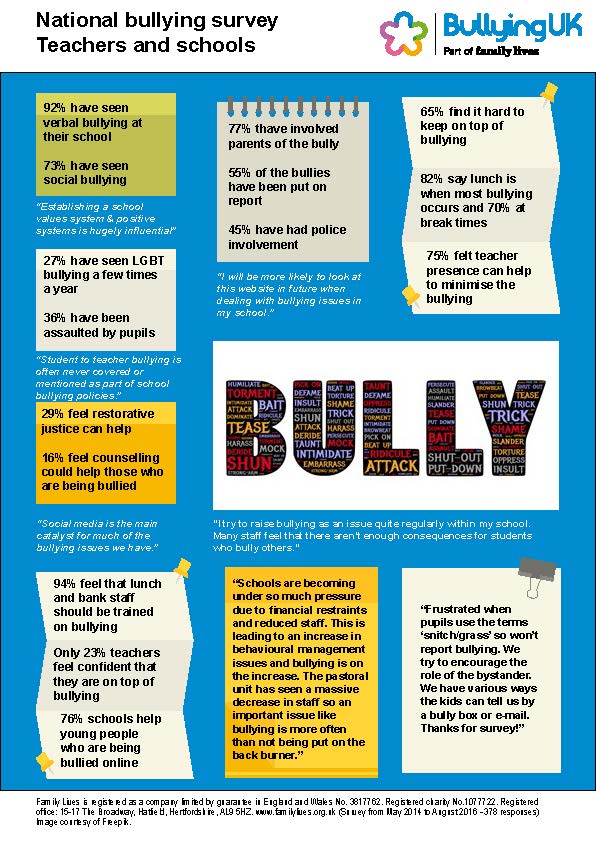
Summary results available at http://www.bullying.co.uk/anti-bullying-week/bullying-uk-national-survey-2014/
Parents or education professionals concerned about bullying can call Family Lives’ Helpline on 0808 800 2222 or visit www.bullying.co.uk for confidential and non-judgemental support.
Also look on https://www.verywellfamily.com/bullying-overview-4581824
Another helpful guide can be found by clicking the following link: https://uk.edubirdie.com/blog/anti-bullying-resources-for-students
Help keep news FREE for our readers
Supporting your local community newspaper/online news outlet is crucial now more than ever. If you believe in independent journalism, then consider making a valuable contribution by making a one-time or monthly donation. We operate in rural areas where providing unbiased news can be challenging. Read More About Supporting The West Wales Chronicle






















